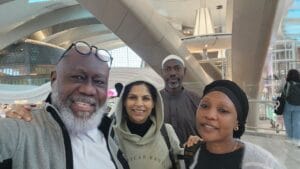Opinion | Is Nigerian Culture in Conflict with Islam?

Nigeria is a country that is very rich in culture. Every part of our life is guided by our cultural beliefs and traditions. Before the emergence of religions, especially Christianity and Islam, traditions effectively catered for our needs: respect for elders, spirituality in Elédùmarè, courtesy, commerce and traditional politics.
Culture and religion are two different, but related aspects of human life. Both represent the manual through which human beings live a moral life. But it is possible, in some instances that what a particular religion nullifies is an acceptable norm or practice in human culture.
In an audio-visual lecture released by The Muslim Congress, the Grand Mufti of the Congress, Sheikh Dhikrullah Shafii, affirmed magisterially that the act of prostrating for an elderly person, which is a courteous habit among Yorùbá male children, and that courteous act of kneeling down or genuflecting, that is common among the Yorùbá female children, should be discarded because it is alien to Islam, and it is considered a sin.
According to Sheikh Shafii, aspects of culture which are contrary to Islamic culture should be completely eliminated.
He explained that devout Muslims should distance themselves from such practices.
To concretize his point, references were made to a number of occasions he was privileged to meet some of the traditional rulers in the Yoruba Land such as Aláàfin of Ọ̀yọ́ Kingdom, Ọba of Lagos, Ọ̀kẹ̀rẹ̀ of Sakí Town and some others. He noted that members of the Congress neither prostrated themselves nor bowed before any of those rulers.
Greetings and Yorùbá Culture
Every tribe in Nigeria has a courteous way of showing respect for elderly people. Among the Yorùbá, it is a tradition for a male child or an adult to prostrate himself to greet an elderly person. A female child or adult kneels down and in some cases, merely genuflect to greet an elderly person. Children adopt the same methods to show respect for their parents and relatives.
In Yorùbá land as well, these acts are a good assessment of an individual level of home training. Whoever violates this age-long tradition is adjudged to lack home training. It is sheer contumacious conduct for a child to greet their parents without either prostrating themselves or going down on their kneels as the case maybe.
Has Islam come to eliminate our age-long culture? Is slam teaching the youth to disrespect the elders? Is greeting not different from worship?
In Islam, like every other religions, human actions are judged by intention. This aspect of our culture was never aimed at worshipping our elders as erroneously believed and condemned by some modern religious groups.
Religions have not existed to erode human culture and tradition. Yorùbá culture is unique in many ways. Apart from the principle of home training which is adequately enshrined in its tradition, Yorùbá culture teaches sartorial modesty, well spelled out for females, males, adults and children.
Not only that, Yorùbá culture imparts enough teaching of table manners to the people.
Modern religious groups should note that Yorùbá culture and tradition violate no religious beliefs. It should also be noted that culture and tradition define us as a people and should not be greeted with derision. Rather, our culture should be accepted as a way of raising children among the Yoruba race.













